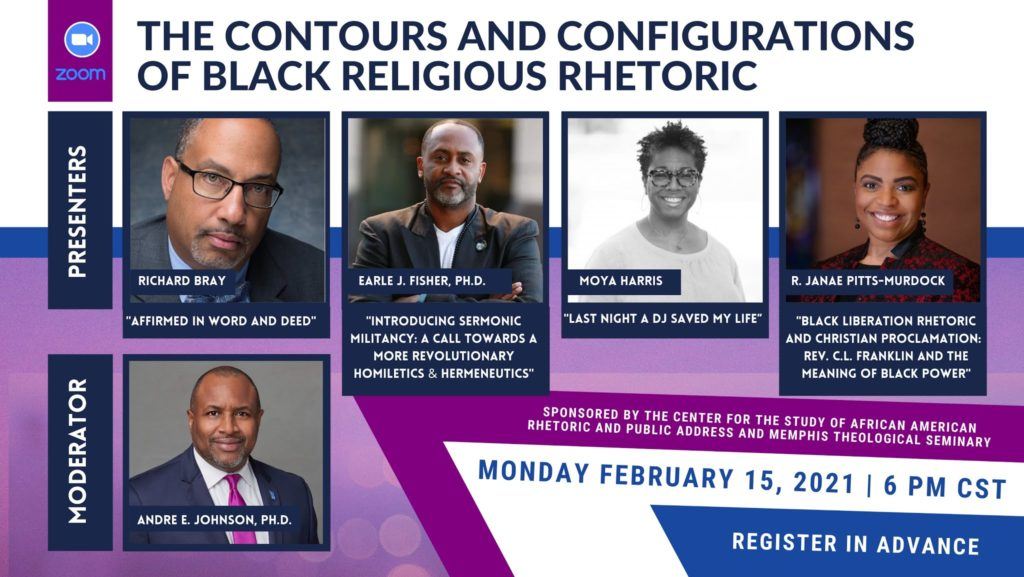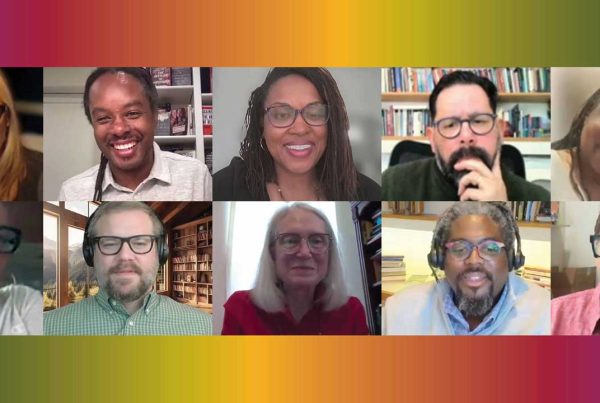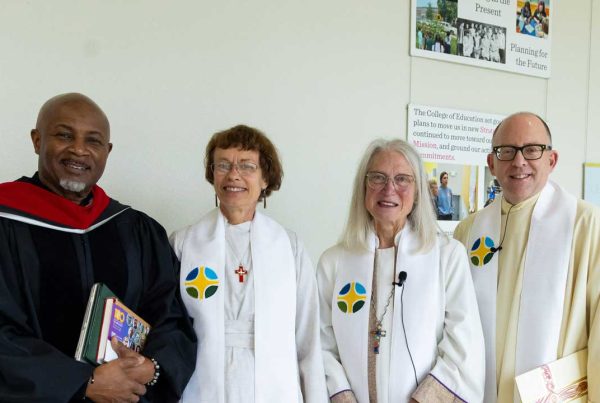 On February 15, 2021, several students in CTS’s PhD Program in African American Preaching and Sacred Rhetoric participated in “Contours and Configurations of Black Religious Rhetoric,” a symposium sponsored by The Center for the Study of African American Rhetoric and Public Address and Memphis Theological Seminary. The symposium was chaired and moderated by Dr. Andre E. Johnson, Associate Professor of Communication at the University of Memphis and an Affiliate Faculty member of CTS’s PhD Program.
On February 15, 2021, several students in CTS’s PhD Program in African American Preaching and Sacred Rhetoric participated in “Contours and Configurations of Black Religious Rhetoric,” a symposium sponsored by The Center for the Study of African American Rhetoric and Public Address and Memphis Theological Seminary. The symposium was chaired and moderated by Dr. Andre E. Johnson, Associate Professor of Communication at the University of Memphis and an Affiliate Faculty member of CTS’s PhD Program.
CTS’s PhD program in African American Preaching and Sacred Rhetoric is committed to developing cutting edge scholar-practitioners deeply connected to the church and the academy, whose research contributes to the ongoing development and greater awareness of the genius of Black preaching. Celebrating CTS’s PhD program and the participation of its students in the symposium, Prof. Frank Thomas said in his opening remarks, “I’m excited to see a vision that Dr. Andre Johnson and I talked about come to be, and for another generation of students…who will be able to far outdistance what we’re able to produce” in carrying on the legacy of scholarship in the field.
The symposium featured research by graduate students and emerging scholars in the field, including CTS PhD students Rev. Moya Harris, Executive Minister and Minister to Women at Metropolitan AME Church in Washington D.C., Rev. Richard Bray, Community Partnerships Manager for IUPUI’s Office of Engagement, and Rev. R. Janae Pitts-Murdock, Senior Pastor at Light of the World Christian Church in Indianapolis, IN.
Each of these students presented aspects of their innovative, exciting, and ongoing research:
Rev. Moya Harris’ presentation was entitled, “Last Night a DJ Saved My Life—The Theoretical Nature of Club Quarantine.” Drawing on the fields of rhetorical theology and theomusicology, Harris examined concepts of the sacred, secular, and profane “to discuss the nature of the DJ in hip hop and pop culture.” Her paper explored the line between sacred and secular in Black culture and argued that the Club Quarantine movement has a theorhetorical dimension and is homiletical in nature.
Rev. Richard Bray’s paper, “Affirmed in Word and Deed,” utilized Critical Discourse Analysis to analyze Rev. Dr. Robert Dungy’s sermon manuscript, “Affirmed in Word and Deed,” which was delivered as Dungy’s inaugural sermon at his predominantly white church appointment. In the paper, Bray examined the inclusive meanings of Dungy’s sermon. Bray’s paper considered the ways in which religious rhetoric can disrupt social norms in congregations and society more broadly.
Rev. R. Janae Pitts-Murdoch offered a paper entitled, “Black Liberation Rhetoric and Christian Proclamation: Rev. C.L. Franklin and The Meaning of Black Power.” Pitts-Murdoch’s paper examined the ways Rev. C.L. Franklin’s 1969 sermon, “The Meaning of Black Power,” presented different conceptions of Black Power in both content and form. In so doing, she considered how “Franklin maneuvers rhetorical obstacles and ultimately produces a somewhat liberating message proclaiming God’s hope for African Americans.”
After the symposium’s papers were presented, the participants fielded questions about their work (at about the 1:10:00 mark).
Memphis Theological Seminary has posted a recording of the conference, including the different paper presentations, which can be watched here:
Learn more about CTS’s PhD Program in African American Preaching and Sacred Rhetoric here.





